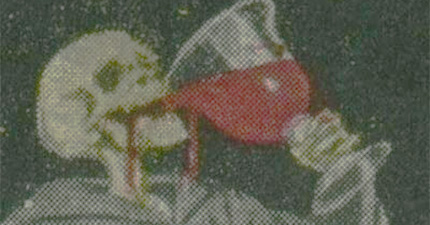The purpose of this article is pleasure. It is about Tony Leung’s eyes. Tony Leung Chiu-Wai is a person whose eyes give all kinds of people pleasure—straight men, gay men, straight women, gay women. I don’t know how he does it. Everyone can appreciate the man who speaks using his eyes.
The first movie that brought Tony’s eyes to a mainstream audience was City of Sadness, a movie about Taiwanese occupation and struggle. Tony Leung happens to speak Cantonese. His Mandarin is very bad. In the movie, he plays a mute man and all of his feelings of pent up rage, innocence, and hatred are expressed through his eyes. A lot of people say that Tony Leung is an old school actor. I would agree. Like Charlie Chaplin, he doesn’t need to speak to tell us a story using his body.
In interviews, Tony is shy. He’s bad at them. In his most recent interviews with Andy Lau about Goldfinger, Tony is demure. He rarely speaks and, when he does, he only says obvious things like, “I love filming with Andy each time” and “I find this genre of film very interesting.” When he speaks English, he has a soft British accent.
Like many others of my generation, I was first introduced to Tony Leung’s eyes through the Infernal Affairs trilogy. In that trilogy, Tony plays a good hearted cop who is working undercover as a gangster. Andy Lau plays a calculating triad member working undercover as a cop. Tony is melancholic but emotionally constipated. When he visits his therapist, who is also the woman he loves, he falls asleep. His warmness is a stark contrast to Andy’s coldness. Tony is a good guy who only has the tools of society while Andy is a bad man who has all of the powers of the state.
In Infernal Affairs, you feel Tony’s detachment through his eyes. He’s jaded. He has lived life for a long time and finds himself far from his purpose. He has no youthful righteousness left. Only when a friend died by police fire, giving his own life to protect Tony’s character, does Tony return to himself. He regains identity not through ideology but through realizing the weight of friendship. His eyes are no longer numb. First the first time, we see Tony shaken. We see wonder in his eyes.
One of the first scenes in Infernal Affairs provides us with the film’s subject matter—Hong Kong is handed back to mainland Chinese governance after British colonialism. Tony’s character has good reason to feel lonely in the beginning of the movie. Not only is he a cop hiding as a triad member, he’s a person whose multiple allegiances have changed without him even realizing it.
Around the time Tony did Infernal Affairs, he had also been captured by Wong Kar Wai. Tony Leung is a Cancer with a Taurus Moon. Wong Kar Wai is a Cancer with either a Cancer or Leo Moon. A Cancer’s world is endlessly nostalgic. One of my friends observed this strange fact—Wong Kar Wai is known as one of the leading figures in Hong Kong’s golden age of cinema but he doesn’t really make movies about Hong Kong. He makes movies about Shanghai, about diaspora, and about lost memories.
In Wong Kar Wai’s universe, Tony portrays someone who misses something that they can’t name. He first appeared in the universe as a chronic gambler. Tony gets up out of bed in a tiny coffin home and does his hair. He’s about to go to the casino. The casino is a site of cultural loss. Tony’s character in In the Mood for Love, which is named after the Zhou Xuan song, is a Shanghainese exile living in Hong Kong. He is about to move to the United States, finds himself in Singapore, and then moves to Cambodia. Once again, we find Tony playing a character who he can’t physically speak as. It doesn’t matter. Tony speaks very little. His eyes are vacant. He looks off to the side and you feel the gut punch of missing a person or a place. Then, he smiles and you realize that you don’t understand what you are missing. You don’t know what you are feeling because the feeling of missing something isn’t a feeling with a presence. It’s a feeling of lack.
The most disturbing movie Tony Leung acts in is Lust, Caution by Lee Ang. Tony plays the ruthless Mr. Yee, a special agent in Shanghai’s puppet government under Japanese occupation. When Tony puts Mr. Yee’s defenses up, he is terrifying and dangerous. When his guard comes down, he is arrogant and despicable. The end result of the movie is predictable and nauseating.
Lust, Caution isn’t the only time Tony plays a Japanese collaborator. In Hidden Blade, he plays a double agent under Japanese occupied Shanghai and starrs opposite Wang Yibo. Hidden Blade isn’t my favorite movie and focused mostly on Wang Yibo’s character but Tony Leung’s eyes once again take a major role. The movie is about the communist insurgency’s bid for Manchuria or Manchuko or Dongbei, a region once at the center of Japan’s imagined empire. In this movie, Tony actually speaks in heavily accented Mandarin. He speaks a lot, particularly in the interrogation scenes when his character intimidates the hell out of communists using a very dominant form of friendliness.
In Hidden Blade, Tony isn’t just Mr. He, communist spy working for the Japanese. He is Tony Leung. He was casted for his star quality and because he is Tony Leung. When Tony becomes Mr. He, he is already Mr. Yee of Lust, Caution, Mr. Chow of In the Mood for Love, and Chan of Infernal Affairs. His eyes are not just the eyes of a man hiding his humanity from his occupiers. In his eyes, we also see a destructive collaborator, an exiled businessman, and a lonely cop who has become a society man. Tony Leung is all of these things—spy, exile, businessman, and gangster.
Tony Leung has eyes that we all like to look at. Most of the time, he’s not looking at anything. Sometimes, he’s looking at a woman but the woman isn’t usually looking back at him. We’re not interested in following Tony’s line of sight. We’re more interested in the psyche behind those nostalgic eyes. His eyes are like a gate. Blink once and its defenses are down. Blink again and they come back up. Tony's eyes contain all of the sadness of Chinese people. They remind us that we are most vulnerable when we are paranoid.
1 of 188
>>>


